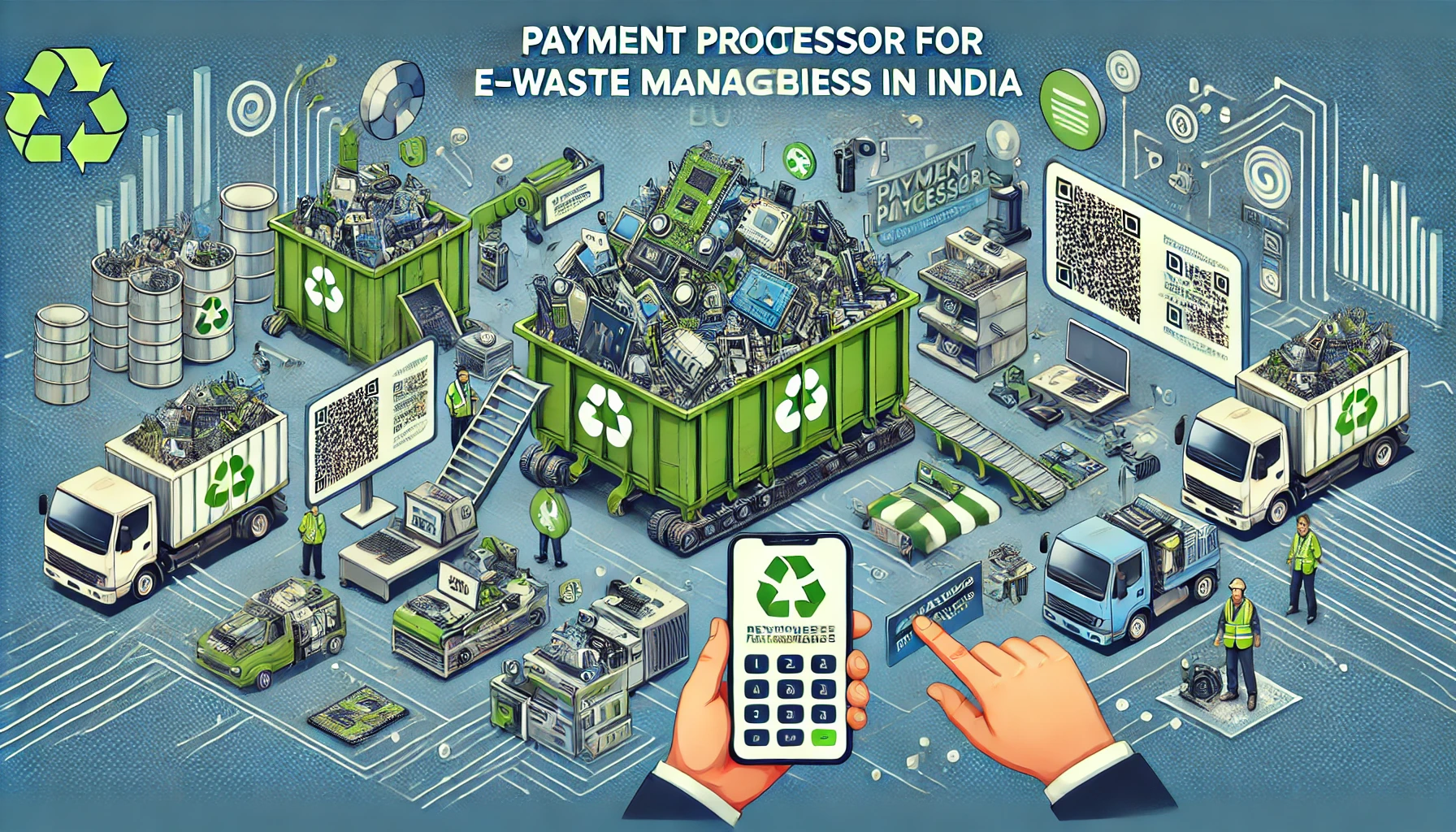Author: Shin Hari
Introduction
In today’s digital world, electronic waste (E-waste) has become a growing concern, especially in countries like India, where the demand for electronic products is surging. With millions of devices becoming obsolete every year, managing E-waste responsibly is essential to protect the environment and public health. One critical aspect of this process is the role of payment processors[1] in ensuring that transactions for E-waste management are secure, efficient, and convenient. In this article, we will explore the role of payment processors in the E-waste management business in India, highlighting their importance in creating a sustainable and effective waste management system.
What Constitutes E-Waste?
E-waste includes discarded electronic items such as mobile phones, laptops, televisions, refrigerators, and other electronic appliances. These devices often contain a mix of toxic substances like lead and mercury and precious metals like gold and palladium, making their proper disposal crucial.
The Alarming Rise of E-Waste
India is one of the fastest-growing markets for electronic goods[2], but this growth comes at a cost. According to the Global E-Waste Monitor 2020, India ranks third globally in e-waste generation. Urban centers like Delhi, Mumbai, and Bangalore are the primary hubs of this waste, driven by increasing consumerism and rapid technological advancements
The Growing Problem of E-Waste in Payment Processing
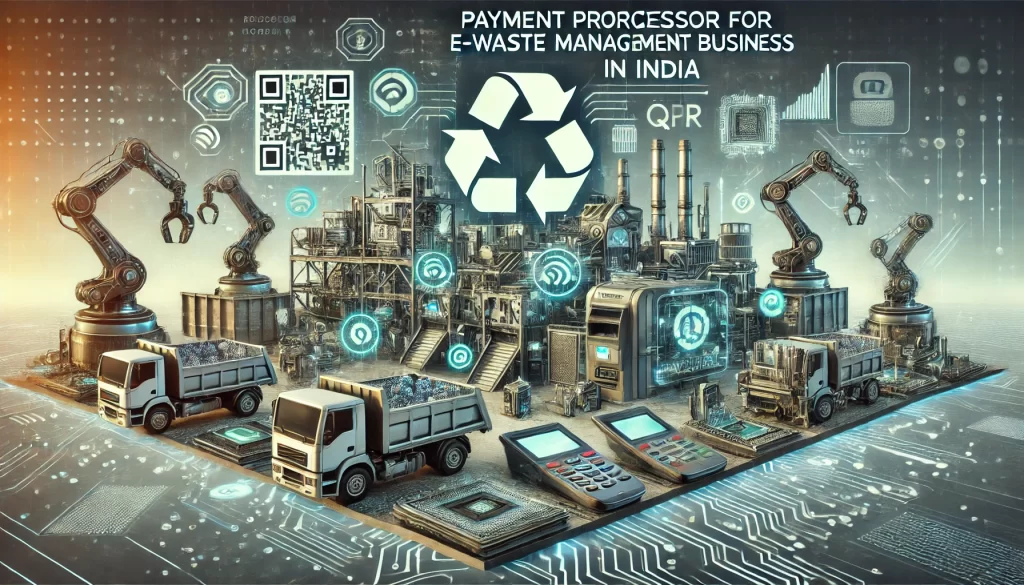
India’s digital payment ecosystem has seen tremendous growth in recent years, spurred by government initiatives like the Digital India campaign. However, as technology advances, older payment processing devices are becoming outdated at a faster pace. With millions of these devices in circulation, improper disposal can contribute to a growing e-waste crisis. The materials in these devices—such as plastic, metals, and circuit boards—can be harmful to both the environment and human health if not managed properly.
The Role of Payment Processors in E-Waste Management
Payment processors, with their established infrastructure, wide-reaching consumer base, and digital tools, are in a prime position to address this issue. By integrating their services into e-waste management efforts, they can offer practical solutions that benefit both the environment and the economy
Challenges in E-Waste Management
1. Limited Awareness
Despite growing awareness about environmental issues, many consumers are unaware of the harmful effects of improper e-waste disposal. This results in items being discarded with regular waste, leading to significant environmental harm.
2. Informal Recycling Practices
Over 90% of India’s e-waste is processed by the informal sector, where workers often use unsafe methods like open burning and acid baths to extract valuable materials, risking their health and the environment.
3. Regulatory and Infrastructure Gaps
While India has established the E-Waste (Management) Rules, 2016, enforcement remains a challenge. Additionally, the lack of adequate recycling facilities, especially in rural areas, hinders effective waste management
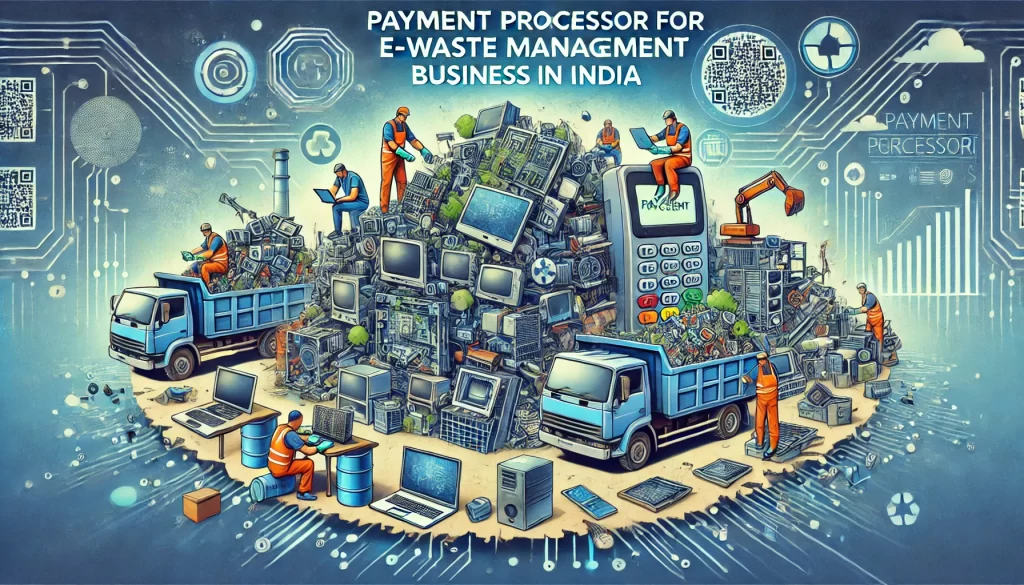
The Business Potential of E-Waste Management
The demand for e-waste recycling is expected to rise in India, providing a significant business opportunity for entrepreneurs and established companies alike. Payment processors are well-positioned to capture a share of this emerging market by integrating their services into the waste management sector
Key Challenges in E-Waste Management for Payment Processors
The challenge of managing e-waste generated by payment processors is multifaceted. One major issue is the lack of proper infrastructure for collection and recycling. While large corporations often have systems in place for e-waste management[3], smaller businesses and individuals may not have access to appropriate disposal channels. As a result, much of the e-waste generated by payment processors ends up in informal recycling operations, which often use harmful practices that can pollute the environment.
E-Waste Management Opportunities in India
Despite the challenges, India also offers numerous opportunities for entrepreneurs in the e-waste management sector. As the market for electronic waste grows, so too does the demand for efficient and environmentally responsible recycling solutions[4]. For businesses looking to enter this space, focusing on payment processor e-waste can be a profitable niche. By setting up e-waste collection points, establishing recycling facilities, or even partnering with manufacturers, entrepreneurs can help close the loop on electronic waste and contribute to a cleaner environment.
Setting Up an E-Waste Management Business for Payment Processors in India
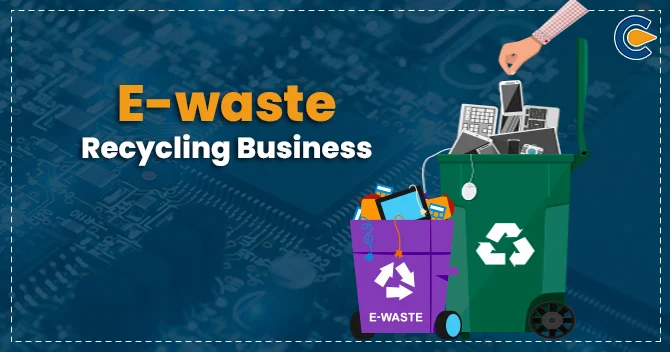
If you’re looking to start a business in this space, the first step is to understand the market. Research the scale of e-waste generated by the payment processing sector and identify the key players, including device manufacturers, retailers, and businesses that use these devices. Once you have a solid understanding of the market dynamics, you can develop a business model focused on collecting, recycling, and reselling components from payment processor e-waste.
The Importance of Proper E-Waste Management
E-waste management plays a crucial role in reducing the environmental impact of discarded electronic devices. Recycling e-waste properly not only prevents harmful substances from entering ecosystems but also helps recover valuable materials like gold, copper, and rare earth metals, which can be reused in manufacturing new devices. For businesses, establishing an effective e-waste management system can enhance their sustainability credentials, improve compliance with regulations, and offer financial incentives such as tax benefits or grants.
Challenges in E-Waste Management for Payment Processors in India
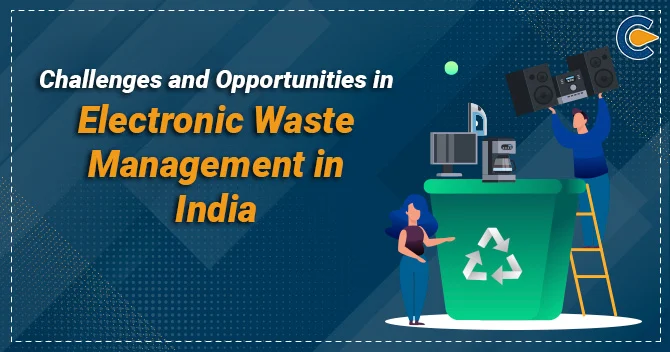
Despite the potential benefits of recycling, several challenges make e-waste management difficult in India. One of the most significant barriers is the lack of widespread awareness regarding the environmental impact of improper disposal. Many businesses and individuals still lack the necessary knowledge about responsible disposal methods for payment processor e-waste
Government Support and Regulations
The Indian government has recognized the growing concern surrounding e-waste and has implemented several measures to regulate the industry. The E-Waste (Management) Rules, 2016, are designed to ensure that electronic waste is handled responsibly, including payment processor devices. These regulations cover aspects such as waste collection, transportation, and recycling, and they mandate that businesses comply with the rules or face penalties
Technological Innovations and the Future of E-Waste Management
As technology continues to advance, the process of e-waste recycling is also evolving. New innovations in recycling technologies[5], such as automation and robotics, have made it possible to process e-waste more efficiently and safely. Robotics, in particular, can be used to handle hazardous materials in a controlled environment, improving the safety and efficiency of the recycling process.
Conclusion
The payment processor e-waste problem in India is both a challenge and an opportunity. With the right approach, businesses can create a profitable venture while contributing to a cleaner environment. By leveraging government support, adopting advanced recycling technologies, and raising awareness, the e-waste management industry can thrive, paving the way for a sustainable future.
FAQs
- What is the primary source of payment processor e-waste in India?
Devices like POS terminals, card readers, and payment kiosks contribute significantly to e-waste. - How can businesses responsibly dispose of outdated payment processors?
Businesses can partner with certified e-waste recyclers or participate in take-back programs offered by manufacturers. - Are there regulations for e-waste management in India?
Yes, the E-Waste Management Rules, 2016, provide a framework for proper handling, recycling, and disposal. - What are the main challenges in e-waste recycling?
Limited infrastructure, lack of awareness, and dominance of the informal sector are key challenges. - How can entrepreneurs profit from e-waste management?
By selling recycled materials, refurbishing devices, and offering corporate recycling solutions, entrepreneurs can create multiple revenue streams.

